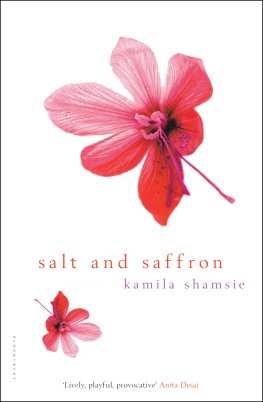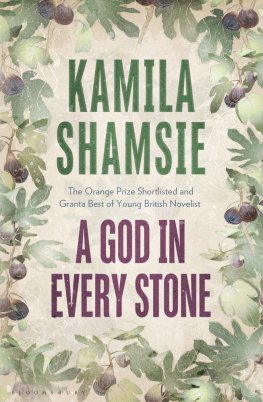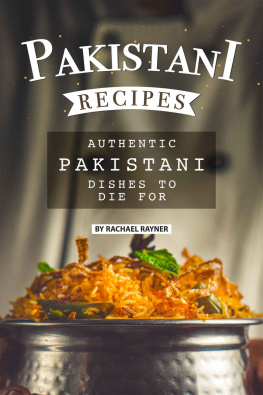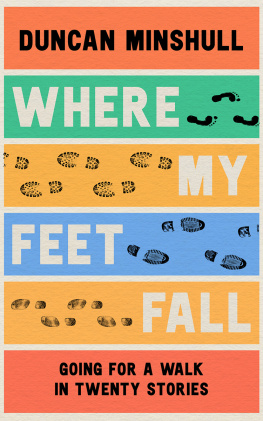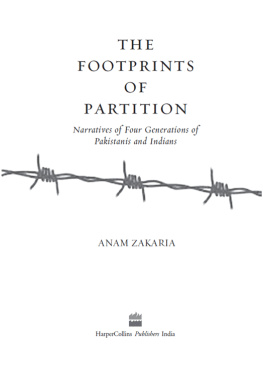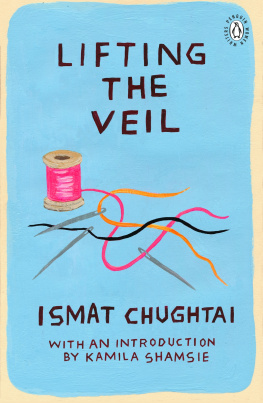Kamila Shamsie
Salt and Saffron
For Victoria Hobbs and Alexandra Pringle
(showing those characters who appear in this story)

*Great-Aunt One-Liner, Booby, Usman related to Aliya through this line
Starched Aunts, Mousy Cousin, Bachelor Uncle related to Aliya through this line
All right, dont scoff, mock or disbelieve: we live in mortal fear of not-quite-twins.
Of course, reduce all stories to their basic elements and youll see all families are possessed of prejudice that alternative name for fear. The only thing that makes us stand apart is our particular choice of I want to say bugaboo. I often want to say bugaboo. Its a word that demands to be said out loud, particularly among bilingual Pakistanis who recognize its resemblance to baghal boo or armpit odour, but its meaning object of baseless terror makes it misleading in this conversation. Nothing baseless in our terror; we have five hundred years of empirical evidence on which to base our fear of not-quite-twins. Ours has always been a scientific family, that way. So I suppose we are unusual. Because, though we are like all families in the almost religious fervour of our prejudices, all the other families we know can point to nothing but stereotype, ignorance and jealousy of their own privilege as a basis for those prejudices and, Ill admit, our contrasting historicity has always made us feel superior.
One of my earliest memories is of Dadi cackling when she heard the news of Hussain Asifs marriage to Natasha Shah. Shia Muhajir marries Sunni Sindhi! How will the bigots react? Disown your own kind, or accept the enemy! Ming-ling! Ring-a-ling! Of course, no multi-culti appreciation of marrying across both sect and ethnicity lay at the root of my grandmothers words. She merely wanted all other family biases confounded and challenged so that she could hold up her head and say, We of the royal family of Dard-e-Dil have always held true to our family fears. No marriages, conversions or redistributions of wealth can change that. Not-quite-twins are not-quite-twins; no way around that. Oh, they may escape undetected for a time, but ultimately they are incapable of disguise, incapable of escaping the category into which they are born, incapable of causing our family anything but pain. I know. Ive read the histories.
Confused? Would you rather I changed the topic to yak milk production?
Yaks milk is green. But, of course, I never got round to telling my fellow passengers that choice tidbit. It takes more than a Nepalese ox to distract attention away from my family. And the occupant of the aisle seat across from me was so grateful for my high-volume chatter which replaced the usual boredom and non-recycled air of the transatlantic economy-class cabin with murder, war, jealousy, and rapidly reversing fortune that he pulled my luggage off the conveyor belt at Heathrow while I was still stuck in the immigration line, waiting for a turbaned Sikh who dropped his aitches to finish scrutinizing my Pakistani passport.
Here, aisle seat said in an American accent, when I finally zigzagged my way to the conveyor belt through luggage trolleys, unknown languages and a hysterical Nordic man who had just been informed that his baggage had been mysteriously rerouted to Nicaragua. I figured this was yours. Any others?
I wanted to say, Where are you from? You look Pakistani now that youve removed your baseball cap, though on the plane I assumed you were a tanned, possibly multi-racial, American. But instead I shook my head, no, and hoisted my grey suitcase with its Gemini zodiac sticker on to a trolley. Aisle seat said I should go ahead, he was still waiting for his second suitcase, no point in me hanging around. He was just being polite, of course that much was obvious by the pauses between words and the way his eyes darted around the terminal building to register his distaste for the surroundings but at that moment I really didnt have the energy that the laws of reciprocal courtesy required so I just nodded and thanked him. We hugged goodbye (his initiative, but I saw no reason to resist) and when I turned to go he said, Hey, Aliya. How much of it is true?
I smiled. A good storyteller never tells.
I walked a few steps away and then turned back. My body had just begun to register the feel of his arms around me. What would my grandmother say if she knew Id been hugging strange men in airports? He was facing away from me, staring at the leather flaps at the end of the conveyor belt through which the luggage emerged, so I could continue to look at him and regret that Id spent so much time on the plane chattering to anyone who cared to listen (two girls had even sat cross-legged in the aisle, listening to my stories until the flight attendant shooed them away and then hung around herself, a pot of coffee cooling in her hand). If Id been a little less intent on entertaining everyone maybe I would have leant over the aisle and talked, actually talked, to him. He knew all my family stories all, except the most important one and I didnt even know his name. I moved towards him, then felt absurd and walked away.
I stepped out into London. Filled my lungs with the 6 a.m. air of summer and slowly, in the lingering manner in which you might peel off a bandage in order to prolong the joy of seeing skin where last there was exposed flesh, I exhaled all residues of aeroplanes and airports from my system. I could have spread my arms wide and spun in tiptoed circles with the joy of terra firma and familiar breezes, but it seemed more expedient to flag down the nearest taxi instead.
Where are you coming from? the cabbie asked, after we had been driving in silence long enough for me to adjust the cultural expectations knob in my brain from America: chatty to England: not.
America, I replied.
But youre not American, he said, in a tone which seemed to imply that I might not be aware of this fact.
No, Im Pakistani.
Ball tamperers, he muttered. Even if he was merely talking about the not-so-long-ago cricket controversy between our two countries, that wasnt polite. I responded with silence. Not the kind of silence with which my cousin, Mariam, filled her days, but rather the silence of my grandmother, which was meant to inform those who received it of the lowliness of their stature. Dadi always accompanied those silences with an upward tilt of her head, as though she were posing for the head of a coin. Strange how, in remove, single gestures can be all that remain to us of people who once inhabited the daily tos-and-fros of our lives. In Massachusetts it was the memory of that tilted head which kept me from writing to Dadi. I suppose the tilt encapsulated for me the way Dadi behaved about Mariam Apa.
The cabbie pulled up to my St. Johns Wood destination after what seemed an unnecessary detour via Lords and I tipped him a more than generous amount. (That was another Dadi trick for making the lowly feel lower, but it didnt seem to produce the desired effect.) I waited for him to drive away before sitting down on my suitcase in the tiny parking lot of Palmer House. Halfway to home, and not just geographically. There, two floors up, the red brick with its starburst of cracks, where the tenant of Flat 121 had slammed down a hammer and yelled at my cousins and me, If you dont stop that singing itll be your heads next. And there, behind the fence, the garbage bin in which I had hidden amongst green cans during a game of hide-and-seek, where curiosity taught me the taste of beer and my father, on finding me, taught me the meaning of backwash, embellishing details sufficiently to engender in me an unshakable paranoia regarding shared drinks. Oh, and up, between the white lace curtains of Flat 77, my cousin Samia staring down at me.

